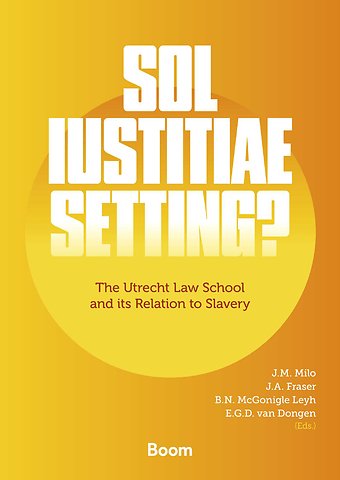Sol Iustitiae Setting?
The Utrecht Law School and its Relation to Slavery
E-book Pdf met watermerkbeveiliging Engels 2025 1e druk 9789400114722Samenvatting
Slavery was legal, in conformity with the law in force in the former colonies of the Kingdom of the Netherlands, until abolition on July 1, 1863. Seldom is it shown more clearly that the law as it stands may indeed be unjust and utterly abject.
The consequences work their way through, which does not surprise at all. Precisely the academic institution that has law and justice as its domain, the law faculty, should be concerned with this past and with its relationship to the institution of slavery. How did the Utrecht law faculty, its professors, students and alumni relate to slavery? A dozen students and four supervisors researched aspects of this relationship.
This book reports on that bewildering past and present. The editors and authors are associated with the Utrecht University Law School as professors and students.
Trefwoorden
slavernij juridische geschiedenis rechtsgeschiedenis utrecht universiteit romeins recht kolonialisme nederlandse geschiedenis juridisch onderwijs transitional justice reparaties koloniaal recht universiteit utrecht romans-nederlands recht nederlands recht mensenrechten wetteksten nederland suriname geschiedenis staatsaansprakelijkheid academische verantwoordelijkheid roman-dutch law west-indische compagnie onderwijs ethiek wetgeving internationaal recht juridische methodologie compensatie afschaffing
Trefwoorden
Specificaties
Lezersrecensies
Inhoudsopgave
Preface
Introduction
Sol Iustitiae Setting. Slavery by Utrecht Law Professors in Learned Law
1 Introduction
2 Roman law and slavery
3 Roman Law’s Reception
4 Roman-Dutch Law
5 Utrecht Scholars on Slavery
6 Roman-Dutch Law in the Colonies
7 Concluding Remarks
Batavian Freedom – On the Tacit Acceptance of Slavery in Dutch Law
1 Introduction
2 Article Two’s Substantive Origins
3 Article 2’s Formation in Parliamentary Debate
4 Understanding Article 2 – Civilian Methodology
5 Scholars: Opzoomer Leading, Diephuis Following
6 Scholars of Some Action
7 Article 2’s Afterlife
8 Conclusions
Can Justice Unleash? An Investigation into the Means of Transitional Justice that the Netherlands Can Deploy for the Processing and Recovery from the Slavery Past and the Liability of the Dutch State for Damages from the Slavery Past
1 Introduction
2 Approaches within the Field of Transitional Justice
3 Measures Taken by the Dutch State
4 Liability of the Dutch State for Damages Resulting from the Slavery Past
5 After the Limitations: the Possibilities
6 Conclusion
Does Time Heal All Wounds? An International Human Rights Law and Natural Law Analysis of Reparations in the Netherlands for Slavery in the Context of Transitional Justice
1 Introduction
2 Legal Framework
3 Natural Law Theoretical Framework
4 Reparation Analysis
5 Final conclusions
‘Not a Full Stop, but a Comma’. The Reparation Program for the Dutch Slavery Past in Light of the Field of Transitional Justice
1 Introduction
2 Historical framework
3 Theoretical Framework
4 Current Reparation Program
5 Transitional Justice Norms and the Current Reparation Program
6 Proposals
7 Proposed Design
8 Conclusion
Jan Ackersdijck against Slavery – A Mission with Method between Law and Economics
1 Introduction
2 A Short Biography
3 Political Economy and Statistics
4 Against Slavery
5 Ackersdijck’s Journal on the Colonies and the Emancipation of the Enslaved
6 Address to the Second Chamber
7 Conclusion
Disrupting the Silent Legacy. Slavery and Criticality in the UU Law School
1 Introduction
2 Theoretical Framework
3 Material Epistemic Exclusions in the Utrecht Law Curriculum
4 Filling the Material Gap: Five Case Studies
5 Epistemic Exclusions Perpetuated by Methodology
6 Filling the Methodology Gap: Critical Lens
7 Practical Proposals for the Course Constitutional Law
8 Conclusion
Follow the Money: A Legal Historical Analysis of the Compensation Provisions in the Dutch Emancipation Act
1 Introduction
2 The 1863 Emancipation Act
3 The Utrecht University School of Law
4 Conclusion
Conclusion
List of Contributors
Anderen die dit e-book kochten, kochten ook
Rubrieken
- advisering
- algemeen management
- coaching en trainen
- communicatie en media
- economie
- financieel management
- inkoop en logistiek
- internet en social media
- it-management / ict
- juridisch
- leiderschap
- marketing
- mens en maatschappij
- non-profit
- ondernemen
- organisatiekunde
- personal finance
- personeelsmanagement
- persoonlijke effectiviteit
- projectmanagement
- psychologie
- reclame en verkoop
- strategisch management
- verandermanagement
- werk en loopbaan







